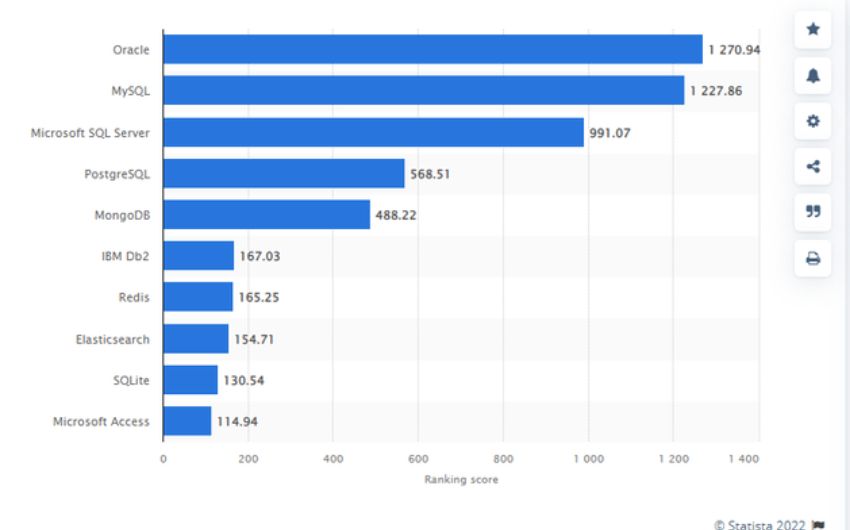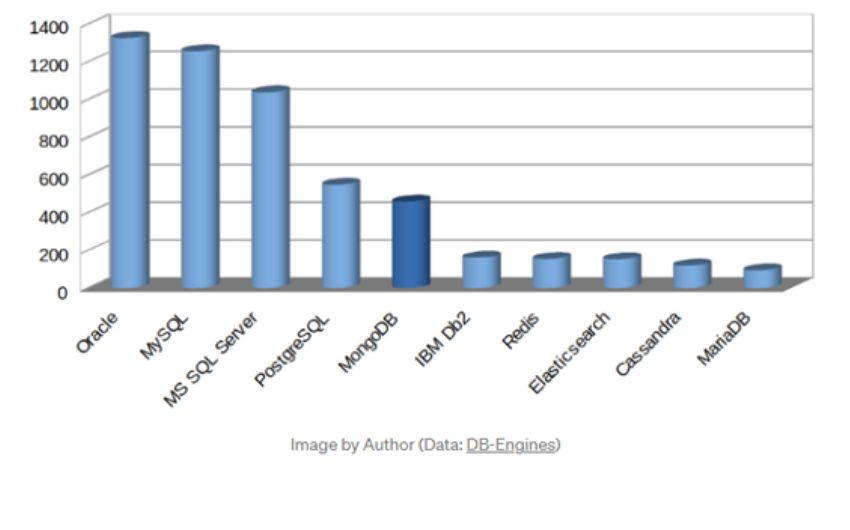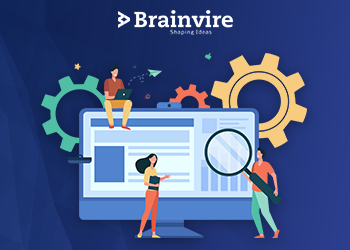The Need for the reliability of database systems
The need for database management system software is immense in the present world of digital transformation. It is important to keep track of all the data collected by various organizations and for different projects these days. A Database Management System Software helps maintain a record of all the processes carried out in an organization.
A DBMS typically offers functionality to create, manage, maintain, query, update, and retrieve data records from a database. There are many different databases that are used by companies, but they all have one thing in common – they need to be reliable.
What is the Role of Databases in Business Operations?
The concept of data has not only introduced new depths for companies but also made it more challenging to operate. However, precise recording and monitoring can help organizations in addressing those challenges by providing them with the necessary information that they need when managing their business effectively.
The database management systems are a must-have for any organization that has more than one data set to manage. These programs connect users with their respective databases and provide easy access so they can get what they need and whenever they need it!
Implementing such systems helps businesses perform well while also saving them the overall costs involved with maintaining large datasets.
A database management system can include a wide range of features depending on the needs of the company. For example, it will include general ledger template for accounting purposes or interface programs to facilitate interaction with other systems. The best database management systems are those tailored to your individual needs and goals.
The security of the data stored in a database needs to be protected so it can’t be accessed by an unauthorized user. This is done by creating passwords for users or limiting permissions on the database so that only certain people have access to it.
DID YOU KNOW?
The global market for database management systems (DBMS) is estimated at nearly $79.2 billion for the year 2022. It is projected to reach $125.6 billion by 2026, growing at a CAGR of 16.3% over the period.
Which types of databases are The Best In 2023?
Data is an integral part of our lives. It is used in everything from social media to the way we work, the entertainment we enjoy, and the way we live. Data has also become a commodity in its own right, with many organizations spending more money on data storage than anything else.
For this reason, organizations are constantly looking for ways to stay ahead of their competition by collecting high-quality data at a faster rate with fewer costs. One way they do that is through database systems. This article will identify the top 20 database systems to use in 2023.
1. Oracle
Oracle is a popular database management system that is gaining popularity due to its scalability and high performance. It is built in assembly languages like Java, C, and C++ and a widely used RDBMS. It occupies lesser space than other databases and has a faster data processing speed.
Oracle continues to be a popular database. The latest release (21C) has added many innovative features that make it an attractive option for future use, according to experts who are watching this space closely!
2. MySQL
MySQL is a tried and true database that has been in high demand as web developers strive for stability, robustness, or maturity. It is written in C and C++ with MySQL 8.0 being the latest database version. Database administrators often need to optimize performance through proper mysql setting variables configuration to handle high-traffic applications effectively.
MySQL gained quick popularity in the industry and community for its enterprise features, flexible license (GPL), as well as upgraded commercial versions. It is one of the most preferred choices for web development solutions.
Facebook, the world’s most popular social media site with over 3 billion users, operates on MySQL.

In a survey by Stack Overflow Developer Survey 2021, MySQL was found to be the most popular database for 2021.
3. MS SQL Server
According to a survey, 1056 companies reportedly use Microsoft SQL Server in their tech stacks, including Accenture, Hepsiburada, and Microsoft.
The Microsoft SQL Server is an excellent choice for environments that require high performance and a wide variety of features. It can be used in any corporate environment for various purposes such as business intelligence or analytics applications, allowing you more insight into your company’s performance with less time spent on tedious tasks. Microsoft has a dozen different editions of Microsoft SQL Server, catering to various audiences and workloads.
The Trend of Microsoft SQL Server Popularity
4. PostgreSQL
For those who need enterprise-level database management, PostgreSQL is hard to beat. With an easy learning curve and support beyond standard functions, it offers a wide range of complex requirements in one package!
Initially, PostgreSQL was called POSTGRES, which was written at the University of California at Berkeley.
With its rich history and ability to grow, PostgreSQL is one of the most advanced open-source databases.
5. MongoDB
MongoDB is the most popular database to use in 2021. It was released back in 2009, and it is considered challenging for object-oriented languages like RDBMS (Relational databases management system) because they have a different way of storing data. Thus, with the inception of MongoDB, handling document type information has become easy with no need for extra applications on top!

6. IBM DB2
IBM’s state-of-the-art platform is powered by AI and designed to deliver data anywhere. Its proven enterprise-ready features allow you to gain insights quickly while cutting costs with its multimodal capabilities that eliminate any need for replicas or migrations in the process.
A flexible foundation powered by modern technologies allows customers to access all aspects of their business at once without having multiple systems holding them back.
The list of databases for mobile apps has grown significantly in recent years, and the most up-to-date release from IBM is DB2 11.5, which speeds up query execution by utilizing object-relational features such as JSON or XML data types to optimize performance on different platforms like Windows, Linux & Unix Systems!
7. Redis
Redis is an open-source, in-memory data store used as both a database and caching system. It provides various structures like strings, lists, hashes, sets sorted sets with range queries, geospatial indexes, bitmaps, hyper logs, and streams.
8. ElasticSearch
Elasticsearch is a full-text search engine that can easily handle horizontal scalability with its automatic sharing feature and API. It has both the ability as well as an eagerness for all types of data – whether it’s logging or monitoring numbers!
9. Cassandra
The combination of the open core architecture and comprehensive column store features makes it possible for Cassandra to handle massive data with ease. This database management software has become one popular option in industries across many sectors because its ability withstands failures, making them ideal when faced by faults or even large amounts of traffic on your site.
10. MariaDB
MariaDB is a Relational Database Management System and compatible with MySQL protocol. It can be used to replace your server seamlessly with no code changes! MariaDB is more community-driven than MySQL. The Maria database has a network architecture that provides columnar storage with massively parallel distributed data, which makes it faster and easier to work with large sets of information.
11. OrientDB
OrientDB is a graph database management solution that enables businesses to use the power of NoSQL without having to build different systems for handling all their data types. It also improves performance, security, and scalability because it supports multiple models like key-value or object-oriented databases as well!
12. SQLite
SQLite is a lightweight and easy-to-use database that doesn’t require any installation or configuration. It has many features of other common databases such as MySQL, which makes it an excellent choice for web development like React Native.
13. DynamoDB
It is the new non-relational database from Amazon, which is serverless in nature. It also backs your data with built-in security, includes caching capabilities to improve performance while still keeping the information fresh without rewrites. And lastly, its consistent latency ensures quick response times no matter what type or scale request you send its way!
14. Neo4j
Neo4j is a graph database that uses the Cypher language to query relationships. The system provides an efficient and effective method for retrieving the required information from the data set in a timely manner. The system’s expressiveness leads to a clear comprehension of the desired information, rendering it a perfect choice for time-sensitive situations where quick decisions are necessary.
15. Firebirdsql
Firebird is a free SQL relational database management system that operates on Mac OS X, Linux, Microsoft Windows, and various Unix platforms. This basic DBMS solution has upgraded the multi-platform RDBMS with its memberships to sponsor commitments for all kinds of financing options!
16. Microsoft Azure
Microsoft has introduced a new managed database service for their cloud platform called Azure SQL Database. It takes care of all the scaling, backup, and high availability needs you might have when using internally developed software.
17. TeamDesk
TeamDesk is an online database platform that allows you to work with data, organize and store information in your routine tasks. You can create a unique solution by customizing pre-defined templates or developing one yourself without programming skills! With Team Desk’s unlimited records & storage features, this product makes it possible for everyone from small businesses to large industries to access tools they need when managing anything related to business practices.
18. InterBase
InterBase system is a versatile and easy-to-use database that can be easily embedded in applications. It has an encrypted nature which makes it secure, allowing you access from anywhere on any device or platform without issue! This software’s performance heavily depends upon its versatility; as such, databases should also have the ability to work across various platforms like Android, Windows, Linux, etc.
19. CouchDB
CouchDB is an open-source document database that doesn’t store data in tables. Instead, each CouchDB document holds its schema and maintains its integrity through JSON formatting for storage purposes.
20. SAP HANA
It is a high-performance in-memory database that provides advanced analytics on multimodel data, on-premise, and the Cloud.
SAP HANA is a powerful engine with cutting-edge features to handle large volumes of complex queries.
It can help you store data in an organized way to use for future reference. You may also need to use it in order to make decisions about the future direction of your business or keep track of trends that are happening at the moment.
Final Note
We hope that with the information and data we have provided, you will find it easier to make an informed decision when choosing a database. In case of any challenges or questions about which is most popular out there feel free to contact us for help!
FAQs
Best way to start a new database from scratch
– Navigate to the File menu, choose New, and then select Blank Database.
– The File Name field is where you should enter the name of the file you’re saving.
– Select new and start typing to add data, or use the techniques outlined in the section Copy data from another source into an Access table to import pre-existing information.
These are some of the most popular databases among developers:
– The Oracle
– MySQL
– MS SQL Server
– PostgreSQL
– MongoDB
– InterBase.
– Microsoft SQL.
– Database Performance Analyzer.
– MySQL.
– PostgreSQL
With MySQL, you may build a database to store and manage your data by specifying the connection between tables. SQL statements are what users type into MySQL to make requests. When a client requests, the server application will send the relevant data.
Both Microsoft SQL Server and Oracle Database utilize SQL. However, Microsoft employs Transact SQL (T-SQL), and Oracle employs Procedural Language SQL (PL/SQL). Segue Technologies claims these two languages are “distinct ‘flavors’ or dialects of SQL,” each with its syntax and features.
Related Articles
-
How Strategy Leads the Digital Transformation
We are living in the 21st century which is a technologically driven era. New technologies and digital advancements approach the market every now and then, take mobile application development services
-
5 Steps You Need to Know to Build a Successful SaaS Business on AWS
According to Statista, AWS dominates the cloud computing market, comprising 31 percent of the total share. After all, the platform offers more than 200 featured services from data centers across
-
Everything You Need to Know About Klevu for Unparalleled Growth and Better User Experience
We often come around with confusing experiences with a Google search. The most common could be, not being able to find the right products despite searching with the relevant keywords.




